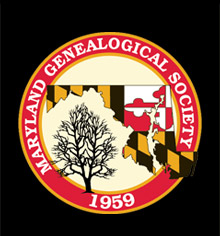
|
Genealogy Resources and Repositories Below are categories of links to key genealogy resources and repositories, with a particular emphasis on Maryland.
Listings: 1 to 18 of 18
|
Updated in 2020, this richly illustrated publication by the Maryland State Archives provides a brief but comprehensive overview of the history of slavery in the state. It includes a bibliography of research sources.
|
|
The Afro-American Historical and Genealogical Society, Inc. (AAHGS) strives to preserve African-ancestored family history, genealogy, and cultural diversity by teaching research techniques and disseminating information throughout the community. The primary goals are to promote scholarly research, provide resources for historical and genealogical studies, create a network of persons with similar interests, and assist members in documenting their histories. There are four Maryland Chapters (see individual listings in this section).
|
|
Allegany, Garrett and Washington Counties in Western Maryland have a rich and diverse history. This site features photos and short narratives of local African American life.
|
|
The Agnes Kane Callum Chapter (Baltimore) of the Afro-American Historical and Genealogical Society is a non-profit organization dedicated to encouraging study and research in history and genealogy. Membership is open to Americans of all ethnic groups and focuses on those with particular interest in African-Americans.
|
|
The Banneker-Douglass Museum, named for Benjamin Banneker and Frederick Douglass, is dedicated to preserving Maryland's African American heritage and serves as the state's official repository of African American material culture.
|
|
The Chapter Goals are to promote scholarly research, professional presentations on research methodologies, and networking with other genealogists. Ongoing activities include classes, skill-building exercises, partnering in areawide Black History Month Genealogy Events, and mentoring. Door prizes at every regular meeting!
|
|
This is a searchable database of detailed personal information about slaves, slaveholders, and free people of color gleaned from petitions to southern legislatures and county courts filed between 1775 and 1867 in fifteen slaveholding states - including Maryland - and the District of Columbia.
|
|
Enslaved: People of the Historical Slave Trade is a public clearinghouse of data on enslaved people in the Americas. The University of Maryland is a partner in the development and maintenance of the site. It includes entries on the enslaved in Maryland.
|
|
In 1838, Maryland's Jesuit priests sold hundreds of men, women, and children to Southern plantations to raise money for the construction of Georgetown University. Though they faced incredible hardship, most didn't perish. They married and raised children. Today, more than 8,000 of their descendants have been located through genealogical research. Use this site to search for an ancestor and to hear the stories of the descendants.
|
|
Maintained by the Maryland State Archives, this web site includes: a searchable database of primary sources including newspapers, court records, etc.; interactive maps to help in locating property owners and slave owners; biographies; and case studies.
|
|
Mapping the Freedman’s Bureau is devoted to helping researchers put their ancestors back on the historical landscape where they lived. The site is devoted to mapping the many places that affected the newly freed survivors of slavery. Research guidance also is available on using Freedman's Bureau records, including for Maryland.
|
|
A guide to resources in the H. Furlong Baldwin Library at the Maryland Center for History and Culture for those researching African Americans or their history, including books, photographs, oral histories, manuscripts, and various records and directories. The collection is strongest in materials from the 19th and 20th centuries. The Library’s significant holding of materials relating to the efforts to colonize freed blacks in Liberia and its transcripts of oral histories are particularly interesting.
|
|
The Chapter is a group of family researchers with ancestral roots in Montgomery County whose aim is to help each other and the public discover the answers to family history questions. Activities include: creating a network of persons with similar interests; assisting members in documenting the history of our ancestors; becoming familiar with resources for historical and genealogical research. The Chapter is dedicated to uncovering the rich African American heritage that continues to contribute to the diversity of the county and the nation.
|
|
The site allows you to explore kinship and family networks of multigenerational black, white, and mixed families of early Washington, D.C. (portions of which originally were part of Maryland). These networks have been created using information derived from court records, as well as genealogical research. Because of the importance of kinship and family in matters of freedom, the petition for freedom case files in particular often contain genealogical information for the black and white families involved in these suits.
|
|
The Prince George's County, Maryland Chapter of AAHGS was organized in July 1994 and chartered 28 April 1995. The objectives are to promote Black History in Prince George's County, to encourage the historical and genealogical studies of African Americans currently residing in the county, and to support the goals and objectives of the national society. To reach these objectives, AAHGS-PGCM conducts activities such as: workshops, speaker forums, discussion groups, onsite research, speakers bureau, exhibits, and networking.
|
|
This blog by professional Maryland genealogist Robyn Smith is designed to highlight genealogy skill building and explore the many challenges of slavery and slave research. The site includes African-American genealogy articles and resources for researching slavery. Several of her own family lines from Maryland are featured in her research examples.
|
|
The museum seeks to be the premier experience and best resource for information and inspiration about the lives of African American Marylanders by collecting, preserving, interpreting, documenting and exhibiting the rich contributions of African American Marylanders from the state's earliest history to the present and the future.
|
|
Revised and reissued in 2018, this illustrated guide offers advice on researching African American families and the sources for doing so at the Maryland State Archives. It includes a timeline of significant laws and events relating to African American history in Maryland.
|
|
|

